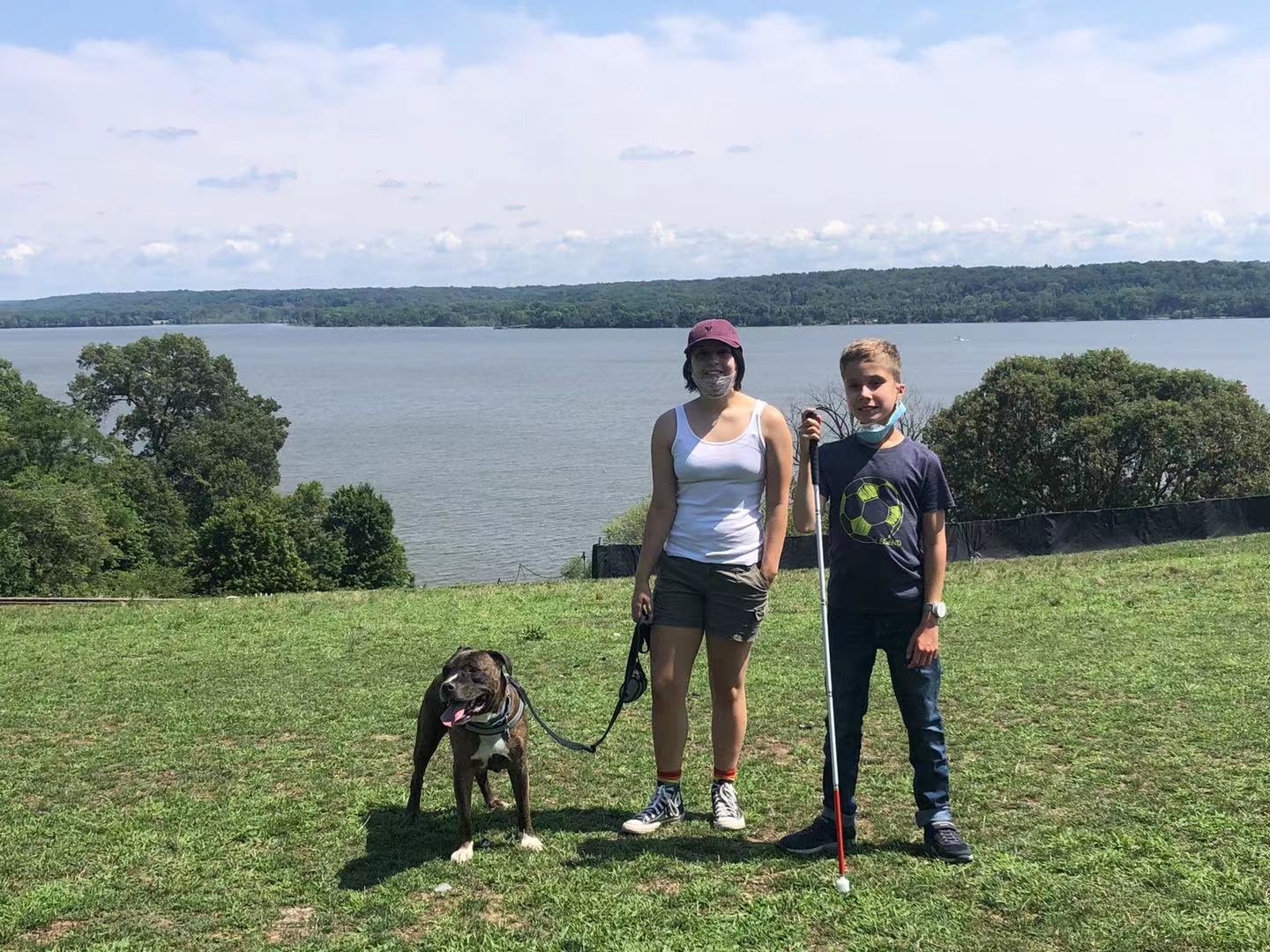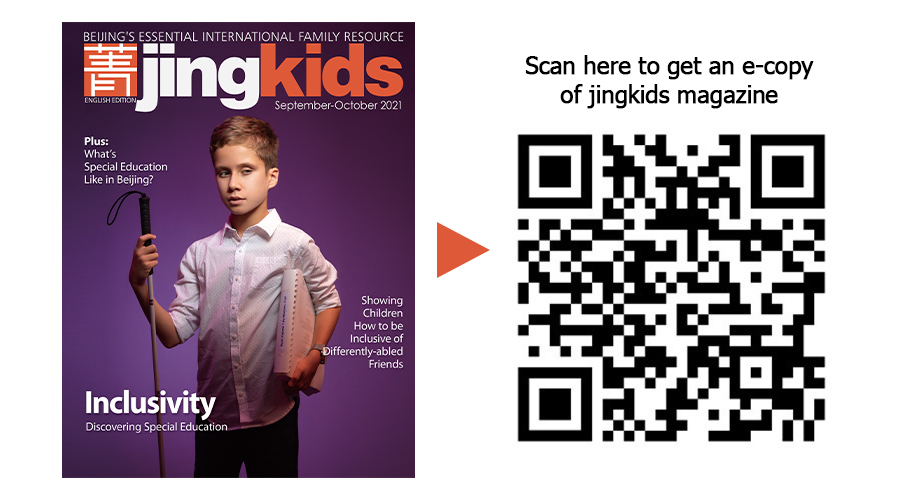Beijing! Without a doubt, one of the first impressions we get of this amazing city is all of the wonders tucked between its historic hutongs and modern skyscrapers. However, have you ever thought about navigating China’s capital without being able to see it? Many might think it’s all but impossible. I mean, imagine not being able to see a perfectly roasted Peking Duck, admire all that history packed into the hutongs, or even cross the busy streets without the gift of sight. Wondering about this and much more, I sat down with Noa Hottin, an expat student at Western Academy of Beijing (WAB) who’s visually impaired, to find out how he experiences life in the city.
 First and foremost, Noa has been impressed by the lengths that WAB’s faculty and student body have gone to make him feel at home, adjusting content to make it more accessible and inclusive, with more visual-assisted learning. Likewise, unlike in some movies, the students have been super kind not only to him but to each other. “WAB’s a nice place where everyone’s super nice to each other,” says Noa, adding, “Students, staff, everyone I meet: There’s no pressure put on me, and all the questions I get are friendly.”
First and foremost, Noa has been impressed by the lengths that WAB’s faculty and student body have gone to make him feel at home, adjusting content to make it more accessible and inclusive, with more visual-assisted learning. Likewise, unlike in some movies, the students have been super kind not only to him but to each other. “WAB’s a nice place where everyone’s super nice to each other,” says Noa, adding, “Students, staff, everyone I meet: There’s no pressure put on me, and all the questions I get are friendly.”
On a more practical level, although he knows the school’s layout like the back of his hand, Noa does mention that as the school undergoes continuous renovations, he sometimes walks into unfamiliar territory and bumps into the furniture.
 But life in Beijing isn’t all about school, and living in this amazing city wouldn’t be complete without visiting places like the Great Wall, delicious restaurants, or dazzling supermalls. And Noa is keen to explore every bit of it. When asked about his hobbies, Noa mentions – before anything else – traveling. “I love to travel, within and out of Beijing,” he says. And his visual impairment hasn’t hindered that love. At just 7-years-old, he was already a seasoned international flyer. One might think that being blind is to live a life of constant fear, but Noa disagrees with the statement. “I obviously feel good in places that are familiar to me. But I don’t feel scared in new places. I feel excited to explore, and being blind has never stopped that desire.” He’s traveled all over Beijing and loves the city’s food and its countryside, believing it to be calming and relaxing, with none of the hustle or bustle of the city. It’s his place to relax and unwind.
But life in Beijing isn’t all about school, and living in this amazing city wouldn’t be complete without visiting places like the Great Wall, delicious restaurants, or dazzling supermalls. And Noa is keen to explore every bit of it. When asked about his hobbies, Noa mentions – before anything else – traveling. “I love to travel, within and out of Beijing,” he says. And his visual impairment hasn’t hindered that love. At just 7-years-old, he was already a seasoned international flyer. One might think that being blind is to live a life of constant fear, but Noa disagrees with the statement. “I obviously feel good in places that are familiar to me. But I don’t feel scared in new places. I feel excited to explore, and being blind has never stopped that desire.” He’s traveled all over Beijing and loves the city’s food and its countryside, believing it to be calming and relaxing, with none of the hustle or bustle of the city. It’s his place to relax and unwind.
 With the help of his trusty cane, life in Beijing has become increasingly easier. But his mother mentioned that over the two years they have traveled in China, they’ve never seen another person on the street with a cane. Likewise, Beijing is the only place they’ve been to that provides Yellow ADA Pads to guide him. Unfortunately, due to China’s massive population, there are cars, bicycles, and motorbikes everywhere, and many of them park on the ADA pads Noa relies on to navigate the city. As his mother explains, “I have no idea how Noa will walk without me because there are so many obstacles. There are cars everywhere.” And yet, Noa doesn’t fault the residents of Beijing, pointing out that the city doesn’t really have specific bike parking spaces.
With the help of his trusty cane, life in Beijing has become increasingly easier. But his mother mentioned that over the two years they have traveled in China, they’ve never seen another person on the street with a cane. Likewise, Beijing is the only place they’ve been to that provides Yellow ADA Pads to guide him. Unfortunately, due to China’s massive population, there are cars, bicycles, and motorbikes everywhere, and many of them park on the ADA pads Noa relies on to navigate the city. As his mother explains, “I have no idea how Noa will walk without me because there are so many obstacles. There are cars everywhere.” And yet, Noa doesn’t fault the residents of Beijing, pointing out that the city doesn’t really have specific bike parking spaces.
 “Beijing is really cool,” says Noa. “There are the Yellow ADA pads, and it’s the first place I’ve lived in which had these.” It’s something unique about Beijing that’s helped him. What’s more, something that makes the city stand out from other countries is Didi, which Noa and his mom consider inexpensive, effective, and good for people who can’t drive. However, Noa does believe that the elevators in Beijing’s metro system need to be improved, such that they are always made accessible from the ground floor. Touching on his previous point, Noa also points out that Beijing needs more parking for bicycles, and more specifically the shared bikes, which are drastically taking over the streets nowadays. That way, the ADA Pads can be accessed, and the bikes do not need to be forcefully moved.
“Beijing is really cool,” says Noa. “There are the Yellow ADA pads, and it’s the first place I’ve lived in which had these.” It’s something unique about Beijing that’s helped him. What’s more, something that makes the city stand out from other countries is Didi, which Noa and his mom consider inexpensive, effective, and good for people who can’t drive. However, Noa does believe that the elevators in Beijing’s metro system need to be improved, such that they are always made accessible from the ground floor. Touching on his previous point, Noa also points out that Beijing needs more parking for bicycles, and more specifically the shared bikes, which are drastically taking over the streets nowadays. That way, the ADA Pads can be accessed, and the bikes do not need to be forcefully moved.
Overall, Noa believes that Beijing is somewhat conducive to visually impaired people, but that there’s also room for improvement. Nevertheless, Beijing is truly a special place, going the extra mile to make sure that everyone in the community feels welcome and at ease. Now that’s what I call a great city.

This article appeared in the jingkids 2021 September-October issue




